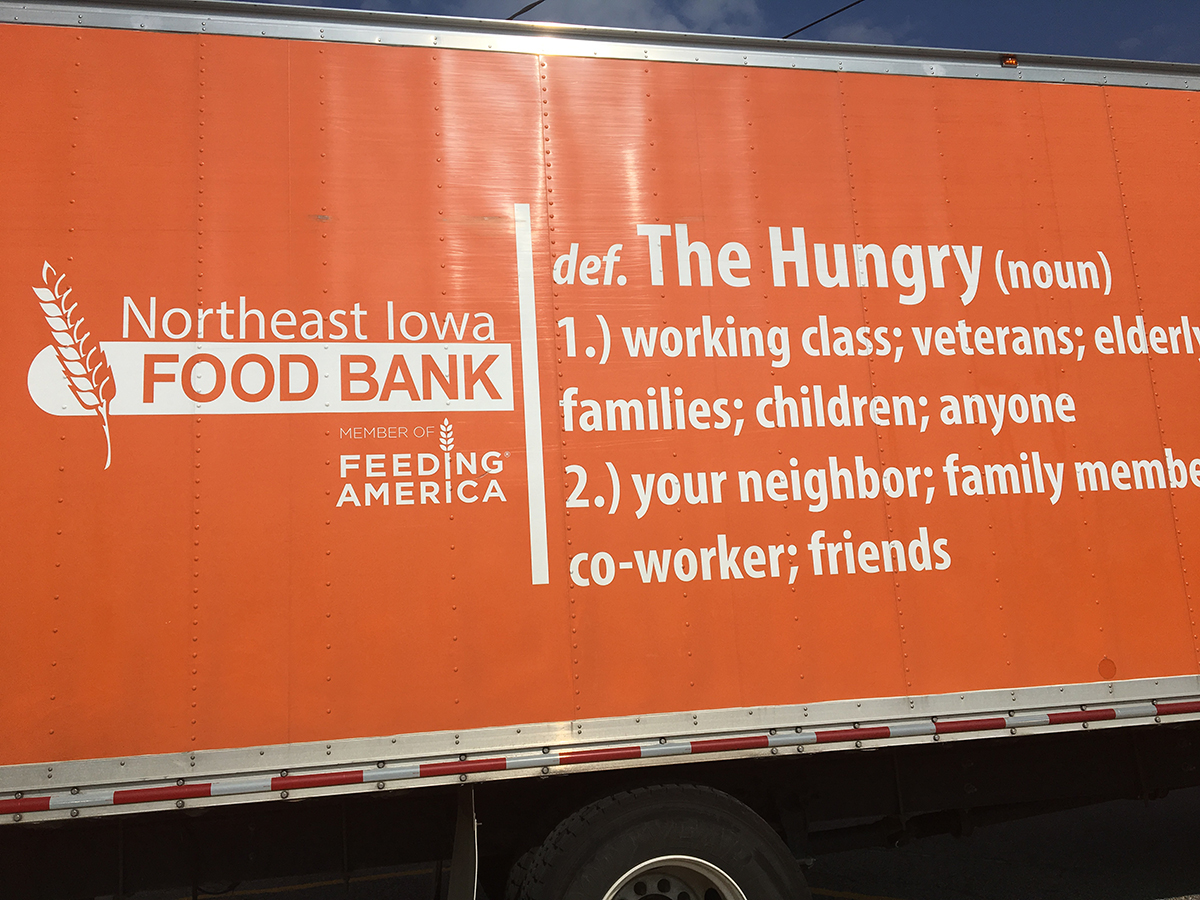“The truck’s here!” A chorus of volunteers’ voices rings out each Thursday morning as the truck with deliveries from the Northeast Iowa Food Bank arrives at the unassuming old fire station on 4th Avenue. There’s a constant hum of activity in the Mid-Iowa Community Action (MICA) office in Grinnell, Iowa, with phones ringing, people coming in and out, and volunteers laughing as they sort through donations.
MICA provides services to families and individuals in need across central Iowa. In the Grinnell office, clients can get bi-monthly food boxes, assistance with heating costs, rent and gas vouchers, and referrals to other services. The Grinnell office also has a family development program, which helps families achieve their goals of self-sufficiency, and a Head Start preschool. Beyond MICA’s own services, the Grinnell office partners with the Substance Abuse Treatment Unit of Central Iowa (SATUCI) two days a week, offering services to recovering addicts. While the Grinnell office provides clients with a large variety of services, MICA runs even more programming across central Iowa, such as school-based programming, dental clinics, juvenile tracking, and more. Poverty in Iowa doesn’t look like poverty in large metropolitan areas across the country. For the most part, there aren’t people begging on street corners or sleeping on park benches. Poverty in Iowa is less visible, which means that low-income Iowans often struggle to access services that might be readily available in larger urban areas. For example, many Iowans lack access to affordable transportation, preventing them from accessing both better paying jobs and social services. If an Iowa family does manage to find transportation, the family usually is still unable to find affordable childcare, forcing them to choose between leaving their children home alone, spending a large portion of their income on childcare, or not working at all. Challenges are even larger for families that cannot afford rent; Iowans often find themselves in doubled-up households, forcing them to live with multiple people in too small a space and with the constant threat of homelessness.
The unique challenges of rural poverty in Iowa require creative solutions, and MICA is just one of many organizations committed to creating those solutions. Every Thursday, MICA’s office in Grinnell receives donations from the Northeast Iowa Food Bank. The Northeast Iowa Food Bank provides local food pantries the opportunity to buy food staples in bulk quantity for low prices. Besides the food bank, MICA gets donations from both local and corporate businesses such as Walmart, Hy-Vee, and Fareway, and from private citizens and farmers. During the summer months, MICA’s shelves are overflowing with produce from local farmers, and during the winters, they get thousands of pounds of canned goods from school and office food drives.
These donations are sorted, organized, and passed out by a team of passionate volunteers. Volunteers at MICA come from all walks of life—retirees looking for a way to pass the time, students seeking to give back to the community, and MICA clients who want to help others in need. Regardless of the reason, volunteers devote countless hours to keep MICA running, and to ensure that the needs of the community are being met.
When I moved to Grinnell in 2018, I was looking for ways to become involved in the broader community and form long-lasting connections. I learned about a Service Learning Work Study (SLWS) position at MICA and applied immediately. In the two years that I’ve worked at MICA, I’ve spent countless hours sorting through and weighing donations, entering client information in our online database, and tracking produce donations. I’ve also been lucky enough to work with MICA’s family development and school-based programming, getting to know our families better while learning more about MICA’s services. Simultaneously, I’ve built a family out of the volunteers and staff. One of my coworkers had me over for dinner with her family and another taught me to drive. Every few weeks, we have office potlucks for someone’s birthday, and we all keep up to date with what’s going on in each other’s lives. Through working at MICA, I’ve done more than make connections with the community, I’ve become part of it, and for that, I’ll always be grateful.

The Northeast Iowa food bank truck vomes to MICA every Thursday to drop off donations for needy families in Grinnell. Photo by Sarah Beisner


